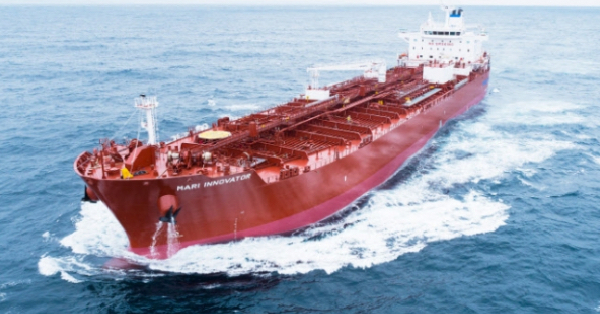As methanol-powered ships are rapidly emerging as next-generation eco-friendly ships, competition is heating up between Korean and Chinese shipbuilders about which is taking more shipbuilding orders. Until now, Korea has been leading the high value-added eco-friendly ship market, but Chinese shipbuilders are in hot pursuit of their Korean rivals by making good use of their capital power and waging a price war.
Korea Shipbuilding & Offshore Engineering (KSOE) is leading the market by having won orders for 54 ships (55 percent) by Feb. 14, more than half of the 101 methanol-powered ships ordered worldwide. This is according to Clarkson Research, a British shipping research institute, on March 9. Most of the rest went to Chinese shipbuilders. A recent increase in orders for methanol-powered ships has been due to the strengthening of global eco-friendly ship regulations. As the International Maritime Organization (IMO) has started regulating greenhouse gas emissions from ships starting this year, all ships with a gross tonnage of 400 tons or more must comply with the Energy Efficiency Existing Ship Index (EEXI) set by the IMO, making the regulations tougher.
Until now, most of the eco-friendly ships have been liquefied natural gas (LNG) ships, which have become the mainstream of the alternative fuel market in the shipping industry. But LNG is also evaluated as a transitional fuel to attain decarbonization goals. Methanol, which has recently emerged as an alternative fuel, has the advantage of being easy to store and transport at room temperature or general atmospheric pressure, and incurring low initial construction cost, unlike LNG, which requires high pressure and cryogenic temperature for storage. Even if discharged into the sea, methanol dissolves in water and causes little pollution.
Korean shipbuilders were able to take the lead in technological competition thanks to their nimble R&D efforts. KSOE began research and development to apply methanol to Himsen Engine, an independent medium-sized engine model of its own development from 2020, and succeeded in a model certification test in September last year, obtaining certificates from seven major classification societies around the world.
In June 2021, KSOE won an order for a small methanol-powered container ship from Maersk, the world’s largest shipping company. The vessel is scheduled to go into a test run soon ahead of its delivery in the first half of this year. In August 2021, Himsen Engine was installed on the world’s first methanol-powered super-large container ship built by KSOE for Maersk.
A big problem facing Korean shipbuilders is that China is preparing an offensive in the high value-added ship market, including methanol-powered ships, by starting a price war. According to the industry, CMA CGM, the world’s third-largest shipping company in France, recently placed an order for six 15,000-TEU methanol propulsion ships with China’s Dalian Shipbuilding, not with a Korean shipbuilder. Korean shipbuilders and Dalian Shipbuilding fiercely competed for this order and China had the upper hand in terms of prices.
Chinese shipbuilders are able to employ such a low-price policy because it has a structure in which state-run shipping companies place large orders with state-run shipyards under the leadership of the Chinese government, so orders and their sizes increase so unit prices go down. The fact that Chinese shipbuilders adopt low-priced simple ship structures compared to Korean shipbuilders and the country’s low labor costs also give an advantage to Chinese shipbuilders in its price war with their Korean competitors.
Another advantage of Chinese shipbuilders is their strong alliances with global shipping companies. “CMA-CGM, a French shipping company, is a member of the Ocean Alliance, a shipping alliance with China’s state-run shipping company COSCO. The two are cooperating with each other,” said an official of the Korean shipbuilding industry. “If an Ocean Alliance member builds a ship at a Chinese shipyard, the member company can expect favorable financial support from the Chinese government, giving them an advantage in order-taking competition.”
Source: BusinessKorea









































